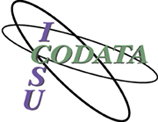 CODATA, in collaboration with GEO,
CODATA, in collaboration with GEO,takes the lead on GEOSS Task DA-06-01:
Furthering the practical application of the
agreed GEOSS data sharing principles
CODATA, the Committee on Data for Science and Technology
cordially invites you to a Satellite Lunch Event at the
Group on Earth
Observations (GEO) Summit on
Thursday 29 th November, 2007
Room1.61 at the 1 st floor
Cape Town International Convention Centre,
South Africa
Furthering the practical application of the agreed GEOSS data sharing principles:
Encouraging timely, global and open access to data
and products
from Earth Observation Systems
12.45-14.00
Lunch will be served at the event
| 12.45 | Welcome | S. Rossouw , Vice-President, CODATA |
| ICSU and GEO | T. Rosswall , Executive Director, ICSU | |
| GEO Background on Task DA-06-01 |
M. Rast, GEO Secretariat | |
| Data Sharing China | GUO Huadong, Director General, Centre for Earth Observation and Digital Earth |
|
| White Paper Summary Overview of the White Paper |
J. Irene Gabrynowicz, Director National Center for Remote Sensing, Air and Space Law, University of Mississippi |
General Discussions and Lunch
More Information contact
CODATA International Secretariat
5 Auguste Vacquerie , 75016 Paris
E-mail: codata@dial.oleane.com
Furthering the practical application of the agreed GEOSS data sharing principles
GEO SUMMIT 2007
Brief description:
In 2006, GEO established Task DA-06-01, “Furthering the Practical Application of the Agreed GEOSS Data Sharing Principles,” and invited GEO Members and Participating Organizations to help implement the task. The International Council for Science (ICSU), working through its interdisciplinary committee, the Committee on Data for Science and Technology (CODATA), agreed to lead this task. In October 2006, in conjunction with the 20 th International CODATA Conference in Beijing , CODATA convened a meeting of experts to discuss the data sharing task and associated implementation issues [CODATA 2007]. (1)
This meeting provided important inputs into the structure and content of this White Paper. Following the experts meeting, CODATA developed an international team of authors and reviewers to draft and refine the White Paper, and to coordinate its activities with various GEO Committees.
This White Paper will review existing data sharing principles and policies; summarize a number of relevant case studies; address implementation issues for GEOSS Data Sharing principles; and recommend implementation guidelines. The object is to ensure the strongest possible framework for data sharing, consistent with both the spirit and the “letter” of the Principles. As recognized by the 10-Year Implementation Plan, “ensuring that such information is available to those who need it is a function of governments and institutions at all levels.”
Added Value and Relevance to GEO:
The GEOSS 10-Year Implementation Plan explicitly acknowledges the importance of data sharing in achieving the GEOSS vision and anticipated societal benefits. All new members of GEO are required to endorse the Plan and therefore these Principles. GEOSS is envisioned as a “system of systems,” built upon existing observational systems and incorporating new systems for Earth observation and modeling that are offered as GEOSS components by Member countries and Participating Organizations. Developing technical interoperability between such diverse systems is clearly a major challenge, but an equally important challenge is the coordination and harmonization of data policies and procedures to facilitate the sharing and use of GEOSS data to maximize societal benefits for the widest possible range of users. Inconsistent or vague data policies and procedures could hamper the rapid dissemination and flexible use of data and information needed for mission-critical and/or life-threatening GEOSS applications. Restrictive policies on data reuse and re-dissemination could significantly reduce the net return on investment of public funds in Earth observations and lead to unnecessary and wasteful duplication of effort. Excessive charges for data could pose substantial barriers to many users, especially those in developing countries who may have no or few alternative sources for data. It is therefore incumbent on governments and institutions participating in GEOSS to develop and implement appropriate policies and procedures that enable and support the GEOSS Data Sharing Principles in fair and effective ways.
The long-run success of GEOSS is likely to be contingent upon the manner in which the visionary GEOSS Data Sharing Principles are implemented, both by the individual elements of GEOSS and the system of systems overall. Although it is apparent that no single set of rules will apply to all types, sources, and uses of data, a clear set of guidelines, definitions, and minimum expectations should help to improve the sharing of data within GEOSS and facilitate the application of GEOSS data by diverse users in the key societal benefit areas.
The guidelines recommended in the White Paper are intended to facilitate this process.
Participants:
The initial work leading to the first draft was carried out by a core number of experts led by CODATA with support from the GEO Secretariat. Review and inputs were sought from a much broader community to ensure that the document reflects the ideas and concerns of GEO member countries and participating organizations.
The review process included:
CODATA/ICSU
External reviewers from different geographical regions, scientific disciplines, scientific organizations and governments
GEO Architecture and Data Committee
GEO Participating Organizations and members
(1) http://www.codata.org/GEOSS/DA-06-01MeetingBeijingOct2006review.pdf
(2) GEOSS Data Sharing Principles:
• There will be full and open exchange of data, metadata, and products shared within GEOSS, recognizing relevant
international instruments and national policies and legislation.
• All shared data, metadata, and products will be made available with minimum time delay and at minimum cost.
• All shared data, metadata, and products free of charge or no more than cost of reproduction will be encouraged
for research and education.
Pg 8. Global earth Observation Systems of Systems 10 year Implementation Plan, as adopted the
16 th of February 2005